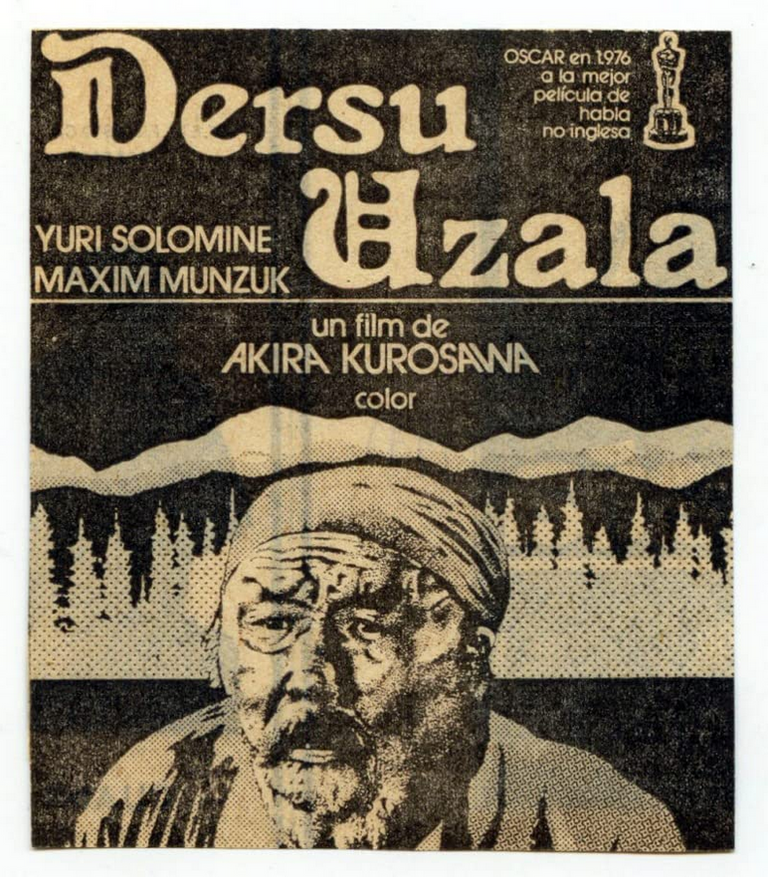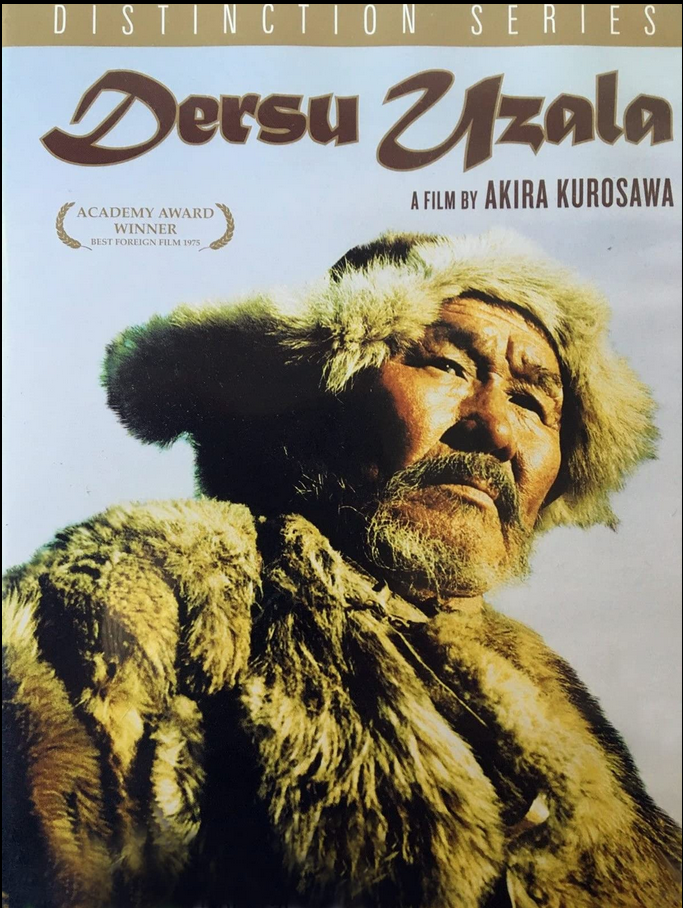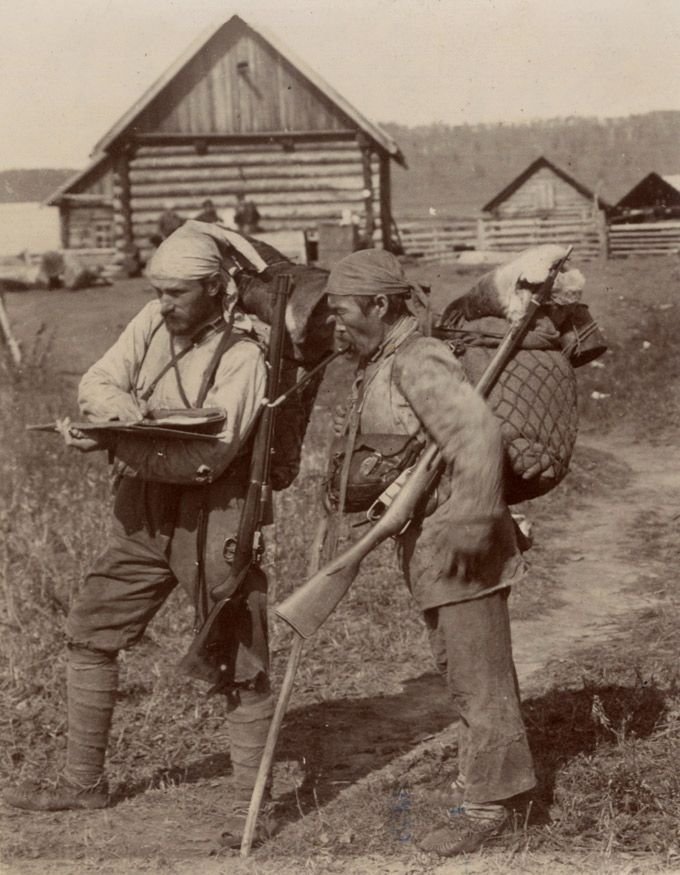|Cine TV Contest| Classics of cinema: Dersu Uzala by Akira Kurosawa (1975). / |Cine TV Contest| Clásicos del cine: Dersu Uzala de Akira Kurosawa (1975).

Dersu Uzala (The Hunter) is a 1975 Soviet-Japanese film directed by Akira Kurosawa and considered one of the acclaimed Japanese filmmaker's greatest works, winning the Oscar statuette for Best Foreign Film in 1976.
The script is based on a true story such as the memoirs written in 1923 by the explorer Vladimir Arseniev about Dersu Uzala, a man of the Hezhen ethnic group who accompanied him as a guide in many of his expeditions through the Siberian region of Sikhote-Alin.

Much of the film takes place in the Siberian taiga and the beginning presents the construction of a village in the middle of the forest, when a man approaches and asks a worker about the grave of a friend he buried three years ago among cedar and birch trees.
Somewhat puzzled, the worker tells him to look wherever he wants, not believing that someone could bury a dead man in the middle of the forest. The newcomer begins to look this way and that until he discovers a mound of earth that marks the location of the grave.
In reality this newcomer is none other than the explorer Captain Vladimir Arseniev (played by Yuri Solomin) and the person buried is none other than his faithful friend and guide Dersu Uzala (magnificently played by Maxim Munzuk).
Immediately the plot of the film goes back in time and places us at the beginning of the 19th century (1902) when a group of expeditionaries is exploring the area of Shkotovo (nowadays a small village with barely 5,000 inhabitants in the Primorsky region, Russia) in order to survey the terrain (all this is absolutely true and has been extracted from the memoirs of the Russian explorer, naturalist, cartographer and writer).
While they are surveying the terrain they happen to meet a nomadic Nanai named Dersu Uzala (in the movie Dersu Uzala, without the accents), an elderly person, a hermit with rough and even rude manners who is accepted by the group and despite all his eccentricities is welcomed for his natural gifts as an observer of the terrain and the environment around him.
Intelligent, with a primordial wisdom and a great sense of compassion towards others, he ends up gaining the trust and respect of the group.
His particular way of reflecting on human reason and living beings in general is translated into an anecdote of the film: at a certain point Uzala asks the explorer and his men to build a hut in the middle of the forest and to leave some food inside it.
The group agrees in a good way, thinking that the old eccentric and hermit wants to live alone, isolated from his fellow men. However, to their surprise, they discover that the hut will be abandoned and Dersu Uzala has had it built, including food, in case at some point some being -human or not- needs it for shelter, rest and food.
His deep knowledge of the terrain makes him save the lives of Captain Arseniev and one of his men on two occasions when a tremendous snowstorm breaks out and they run the risk of freezing to death. Dersu Uzala, using his own work tools (for the scouts a gift as precious as his own life), manages to build an emergency hut and repair them from the intense cold. And when he saves him from drowning in a river by approaching it in the middle of the rapids of the current.
In this way the cinematographic story is intertwined and the years go by uniting both men with a feeling of trust and indissoluble friendship.
But everything comes to an end and the expedition cycle comes to an end. Dersu Uzala returns to his taiga and the rest of the group returns to their hometowns by train.
Life in a hostile environment becomes more and more difficult for Dersu, his eyesight and other senses begin to fail and that is hard to bear for a hunter in the middle of the Siberian taiga until he is attacked by a tiger he calls Amba and manages to wound it, despite his lack of reflexes.
From that moment on he begins to decline physically and mentally and blames himself, attributing the loss of some of his senses to a kind of curse for having killed the tiger, even though it was in self-defense.
When Captain Arseniev finds him again in a risky condition to continue living alone in that environment, he decides to take him with him to the city of Khabarovsk where he lives with his family. However, living in an unknown environment saddens Dersu even more and he asks the captain to let him return to his native taiga.
Arseniev realizes that it is useless to keep him, how much he suffers while still living with extreme comfort but missing not being able to go hunting and live in the taiga, which is an essential part of his life. As a parting gift, he presents him with a lighter and more modern rifle, with which he can hunt without his lack of sight being a problem.
A few days later Arseniev receives a telegram notifying him that the lifeless body -apparently murdered- of an unidentified nanai has been found, but which supposedly may be Dersu's, something he confirms as soon as he arrives and sees the corpse.
The final scenes show Arseniev grieving not only for the violent death of his friend but also thinking that he himself is probably indirectly responsible for the death of his friend, probably in order to steal his modern rifle, an element of great value in that area where to survive you have to know how to hunt and to carry out this task a good rifle is a gift from heaven.

Maxim Munzuk as Dersú Uzalá
Yuri Mefódievich Solómin as Capitán Vladímir Arséniev Svetlana Danilchenko as Anna Arsénieva
Dima Korshikov as Vova Arséniev
Suímenkul Chokmorov as Zchan Bao
Vladimir Kremena as Turtyguin
Aleksandr Pyatkov as Olentiev


Dersu Uzala (El cazador) es una película soviético-japonesa del año 1975 dirigida por Akira Kurosawa y considerada una de las obras cumbres del aclamado cineasta japonés merecedora de la estatuilla del Oscar a la mejor película extranjera en el año 1976.
El guión está basado en una historia real como lo son las memorias escritas en 1923 por el explorador Vladímir Arséniev sobre Dersu Uzala, un hombre de la etnia hezhen que lo acompañó como guía en muchas de sus expediciones por la región siberiana de Sijoté-Alín.

Gran parte de la película se desarrolla en la taiga siberiana y el inicio presenta la construcción de una villa en medio del bosque, cuando un hombre se acerca y pregunta a un obrero por la tumba de un amigo al que enterró hace tres años atrás entre cedros y abedules.
Algo desconcertado el obrero le indica que mire por donde quiera, no creyendo que alguien pudiera enterrar a un muerto en medio del bosque. El hombre recién llegado comienza a mirar hacia un lado y hacia otro hasta que descubre un montículo de tierra que señala la ubicación de la tumba.
En realidad ese forastero recién llegado no es otro que el explorador Capitán Vladímir Arséniev (interpretado por Yuri Solomin) y la persona enterrada no en sino su fiel amigo y guia Dersu Uzala (magníficamente interpretado por Maxim Munzuk).
Inmediatamente la trama de la película retrocede en el tiempo y nos sitúa a inicios del siglo XIX (1902) cuando un grupo de expedicionarios está explorando el área de Shkotovo (actualmente es una pequeña población con apenas 5.000 habitantes en la región de Primorsky, Rusia) con el fin de topografiar el terreno (todo esto es absolutamente verdadero y ha sido extraído de las memorias del explorador, naturalista, cartógrafo y escritor ruso).
Mientras están haciendo los relevamientos del terreno se encuentra casualmente con un nómade de raza nanái llamado Dersú Uzalá (en la película Dersu Uzala, sin los acentos), una persona anciana, un ermitaño de modales rudos y hasta maleducados que es aceptado por el grupo y no obstante todas sus excentricidades es bienvenido por su dotes naturales de observador del terrreno y del medio ambiente que lo rosea.
Inteligente, de una sabiduría primordial y con un gran sentido de compasión hacia los demás acaba ganándose la confianza y el respeto del grupo.
Su particular manera de reflexionar sobre la raz humana y los seres vivos en general se traduce en una anécdota de la película: en un determinado momento Uzala le pide al explorador y a sus hombres de construir un cabaña en medio del bosque y de dejar algunos alimentos dentro de ella.
El grupo aconsiente de buena manera pensando que el viejo excétrico y ermitaño quiera vivir solo, aislado de sus semejantes. Sin embargo cuúl no es su sopresa cuando descubren que la cabaña quedará abandonado y Dersu Uzala la ha hecho construir, alimentos inclusos, por si en algún momento algún ser -humano o no- la necesita para cobijarse, descansar y alimentarse.
Su profundo conocimiento del terreno hace que salve la vida del capitán Arséniev y de uno de sus hombres en dos ocasiones cuando se desata una tremenda tormenta de nieve y corren el riesgo de morir congelados. Dersu Uzala usando sus mismos instrumentos de trabajo (para los exploradores un don tan preciado como su propia vida) logra construir una cabaña de emergencia y repararlos del intenso frío. Y cuando lo salva de morir ahogado en un río al acer en medio de los rápidos de la corriente.
De esta manera se va entrelazando el relato cinematográfico y van pasando los años uniendo ambos hombres con un sentimiento de confianza y amistad indisoluble.
Pero todo termina y también el ciclo de la expedición llega a su fin. Dersu Uzala vuelve a su taiga y el resto del grupo vuelve a sus ciudades de orígenes a través del tren.
La vida en un ambiente hostil se vuelve cada día mas difícil para Dersu, la vista y los demás sentidos comienzan a flaquear y eso es duro de sobrellevar para un cazador en medio de la taiga siberiana hasta que en una ocasión es atacado por un tigre al que llama Amba al que consigue herir, a pesar de su falta de reflejos.
A partir de ese momento comienza a declinar física y mentalmente y se culpa a sì mismo atribuyendo la pérdida de algunos sentidos a una especie de maldición por haber matado al tigre, aunque fuera en defensa propia.
Cuando el capitán Arséniev lo vuelve a encontrar en condiciones de riesgo para seguir viviendo solo en ese ambiente decide de llevarlo consigo a la ciudad de Jabárovsk donde vive con su familia. Sin embargo vivir en un ambiente para él desconocido entristece a Dersu aún m0s y le pide al capitán de dejarlo regresar a su taiga natal.
Arséniev se da cuenta que es inútil retenerlo, lo mucho que sufre aún viviendo con extrema comidadas pero extrañando el no poder salir a cazar y vivir dentro de la taiga que es parte esencial de su vida. Como regalo de despedida, le obsequia con un rifle más moderno y ligero, con el que poder cazar sin que su falta de vista le suponga ningún problema.
Algunos días más tarde Arséniev recibe un telegrama en el que le notifican que han hallado el cuerpo sin vida -aparentemente asesinado- de un nanái sin identificación, pero que supuestamente puede ser el de Dersu, algo que confirma apenas llega y ve el cadáver.
Las escenas finales muestran a un Arséniev acongojado no solo por la muerte violenta de su amigo sino también pensando que probablemente él mismo sea responsable indirectamente de la muerte de su amigo producida probablemente con el fin de robarle el moderno fusil, un elemento de gran valor en esa zona donde para sobrevivir hay que saber cazar y para llevar a cabo esta tarea un buen fusil es uun don del cielo.

La película obtuvo varios premios entre los que destacan el Óscar de la Academia de Hollywood a la mejor película extranjera en el año 1976.
También fue premiada con el David de Donatello de la Academia de Cine Italiana un año después en 1977 y con el premio a mejor película en el Festival de Cine de Moscú en el mismo año en que se exhibió la película por primera vez en 1975.

Maxim Munzuk como Dersú Uzalá
Yuri Mefódievich Solómin como Capitán Vladímir Arséniev Svetlana Danilchenko como Anna Arsénieva
Dima Korshikov como Vova Arséniev
Suímenkul Chokmorov como Zchan Bao
Vladimir Kremena como Turtyguin
Aleksandr Pyatkov como Olentiev
Dersu Uzala - Trailer -


https://twitter.com/belmaxhugo/status/1501297411217448963
The rewards earned on this comment will go directly to the person sharing the post on Twitter as long as they are registered with @poshtoken. Sign up at https://hiveposh.com.
Thank you for curating and voting for my content @poshtoken.
Congratulations @hubeyma! You have completed the following achievement on the Hive blockchain and have been rewarded with new badge(s):
Your next target is to reach 9000 upvotes.
You can view your badges on your board and compare yourself to others in the Ranking
If you no longer want to receive notifications, reply to this comment with the word
STOPTo support your work, I also upvoted your post!
Check out the last post from @hivebuzz:
Support the HiveBuzz project. Vote for our proposal!
Thank you for curating and voting for my content @hivebuzz and for the medals and trophies received.
Regards!
De nada @hubeyma, es un placer 😊👍
Por cierto, ¡podemos pedirle que apoye nuestra propuesta para 2022 para que nuestro equipo pueda continuar con su trabajo!
Puedes hacerlo en peakd, ecency, Hive.blog o con HiveSigner.
https://peakd.com/me/proposals/199
¡Muchas gracias !
Hace usted una buena reseña de un filme de Kurosawa que personalmente aprecio mucho (junto con Vivir y Sueños). Hecho en falta una opinión personal con respecto al filme. Saludos, @hubeyma.
Gracias por comentar y curar mis contenidos @celf.magazine. No he visto ninguno de los dos películas que mencionas pero la filmografía de Kurosawa es muy vasta. Voy a ver si los encuentro, gracias por mencionarlo.
Que interesante historia la cuenta esta película la buscaré para verla, saludos!!
No te vas a a arrepentir seguramente, es un verdadero canto a la solidaridad humana donde solo cuentan los lazos de amistad en un ambiente tan natural como es la taiga siberiana.
Saludos @joseantpp.
Excelente gusto amigo, de Akira Kurosawa tengo pendiente Ran basada en una obra de Shakespeare. Saludos.
Con Kurosawa hay que solo elegir @nbarrios67, todos las películas del gran maestro del cine son fantásticas.
Ran es una de sus últimas obras en su extensa filmografía de la cuál he visto Los Siete Samurais, Kagemusha o Rashomon entre otros muchas de ellas con la actuación del formidable Toshiro Mifune.
Saludos.